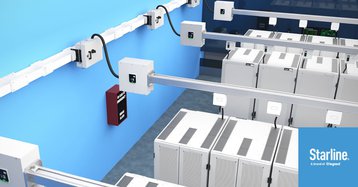We seem to be (fingers-crossed, touch wood) in an assuredly post-pandemic place nowadays, and the data center industry has been left picking up the pieces.
Or, perhaps more accurately, desperately trying to find the pieces available.
Supply chain issues are impacting everyone in the data center industry, and are making it more important than ever to be offering reliable and flexible solutions.
We sat down with JP Burger, the UK and Iceland’s regional sales manager for Starline, to talk about how the company is jumping over these hurdles.
“There have been so many challenges in the industry over the last couple of years. We've gone from facing a pandemic, which interestingly enough, didn't affect the global shortage we're facing today for materials because we still had that backlog coming from the suppliers,” explains Burger.
“But the pinch point has definitely set in this year. In a lot of the projects we’re working on with customers, we're finding that we aren’t in control of those lead times anymore. Not even our suppliers are. Everybody is trying to meet their customers' requirements; they're trying to meet our requirements, we're trying to meet our customer requirements, and we end up managing those expectations more than anything else.
“Pre-pandemic, data centers were being deployed really quickly. But now we've got a scenario where we are facing those long lead times. As materials start arriving, we're having to move faster and faster on every project, which means that we can't wait to think about the deployment of what's required for the data center.”
Time is of the essence, and while it is little comfort, this is at least a global problem, not one solely experienced by Starline (or by you!).
So how is Starline attempting to face this issue head-on? Quite literally, they are attempting to plan ahead.
“What we've done and we continue to do, is work with the end users across the globe. We are focusing on developing a bill of materials for specific applications. That allows the customer to feel that they've got the confidence in what they expect to have in their deployment for the data center,” says Burger.
“We sit down with our customers, understand their requirements to feed the power to their cabinets, and then we come up with a bill of materials that they can then hand to the specifiers and contractors, which allows them to have a starting point. And that also means that when that opportunity falls on my desk, I already know 80 percent of what's required: we just need to do the fine-tuning.”
This planning ahead is what drives the flexibility of Starline’s products. There are no one-size fits all approaches. Instead, an assessment is made of the customer’s needs, and a plan is put in place.
But it is not only flexibility that remains so important. In a mission-critical industry, reliability must always be at the forefront of any product, building, or service. For Starline, this is achieved through a rigorous testing process.
“At Starline, we've been deploying these products in the marketplace for 30 years, and the reliability factor is always built at the forefront.”
Starline is well known for its busbar and busway power distribution systems, systems that unavoidably come with the possibility of arc flash incidents.
“Take the Starline product, whereby you're able to insert a tap-off into a live busbar system which we have certified.
“People proclaim that they can do this, they can do that, and it's been tested. But we have gone one step further. We said, we're not just going to say that we are, we're going to go and test it, we're going to have an independent company put it through its paces, and check if you can insert this live, etc.
“So, we're testing the product itself all the time. But what we're also doing is testing the quality of the products that come into our facility, products that come in from a third party and we're talking copper, miniature circuit breakers, meters, aluminum, and raw materials. They are inspected when they arrive in our facility: we don't just build the equipment, test it and find out that it is incorrect or there's a failure.
“If it doesn't meet our standard, quality standards, then it's rejected. And our suppliers work with us on the basis that we actually have the right to test their product when they deliver it to our facility.”
More from Starline
-

Event News CoolDC is Energy Smart
-

-



